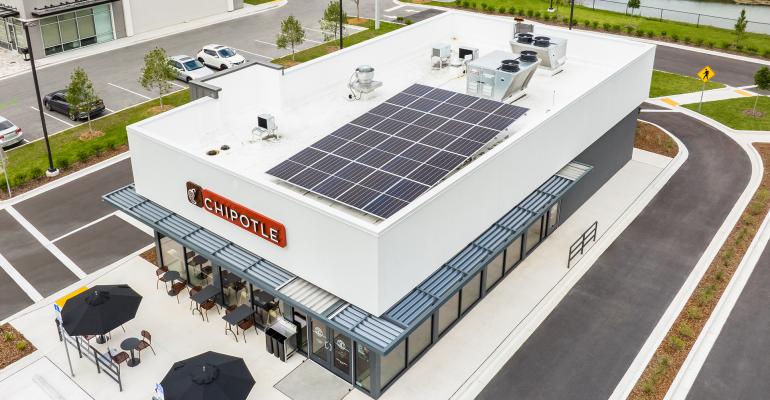Chipotle Mexican Grill today unveiled what it is calling a new “responsible restaurant design," which uses energy-efficient equipment and systems, and 100% renewable energy from wind and solar power through the purchase of certified renewable energy credits. Additional features include electric charging stations at select locations, biodegradable products such as cutlery, straws and bowls, cactus leather chairs, and artwork made from recycled husks.
The company plans to have more than 100 of its new locations in 2024 using the all-electric equipment, as well as other elements from the new design.
This announcement comes as Chipotle releases its 2022 sustainability report, available here. In the report, the company notes it completed energy audits with a third party in 2022 and started the development and test of various kitchen equipment to reduce energy usage. This includes a more efficient rice cooker and changes in the cookline design to reduce energy consumed by hood fans.
“We assessed every piece of equipment in our restaurants to determine how to transition to a low carbon design, while not sacrificing food safety, quality, and productivity,” the report states.
There are currently two restaurants open with the design’s new features – in Gloucester, Virginia, and Jacksonville, Florida. A third is planned to open this summer in Castle Rock, Colorado.
According to the company, the new restaurant design pilot will help Chipotle progress toward its science-based targets, established in alignment with Science Based Targets initiative, to reduce direct and indirect greenhouse gas emissions by 50% by 2030 compared to a 2019 baseline. The new features add to design elements already applied at a majority of Chipotle restaurants, including full LED lighting, high efficiency heating and cooling systems, energy management systems, low-flow plumbing fixtures, tankless water heaters, EnergyStar-rated kitchen equipment and low volatile organic compounds finishes. According to the company, approximately 65,000 megawatt hours were saved through energy management systems in its restaurants, or enough energy to power over 6,100 homes a year.
During a recent interview, Laurie Schalow, Chipotle’s chief corporate affairs and food safety officer, said a focus on environmental stewardship has always been important “and expected” from the brand.
“Chipotle’s advantage is it was founded on principles around food with integrity, which naturally leads to ESG [environmental, social and governance] efforts. It’s not often you find the opportunity to do something that is great for the environment, great for people and great for business. We've always done that. It’s always been important and expected from our brand,” she said. “We believe we have a duty to be a leader in these areas.”
As Chipotle continues to expand its footprint, with a target of 7,000 restaurants, its new restaurant design could come heavily into play to reduce its carbon footprint and achieve its emissions reduction goals. Chipotle is also focused on other initiatives per its newly released report, such as adding more vegan and vegetarian menu items, investing in partnerships to reduce emissions in beef and dairy production, and increasing the amount of local produce purchases.
More companies have made emissions reductions goals, including Yum Brands, which is aiming for net-zero emissions by 2050. In 2018, McDonald's became the first restaurant company to commit to emissions reduction. More companies have recently started leaning in on solar energy specifically, including McDonald’s, which recently signed agreements to purchase renewable energy for its supply chain, as well as for some of its restaurants. KFC recently installed a solar-powered drive-thru in California, while Starbucks launched a solar energy test in 2019.
Contact Alicia Kelso at [email protected]





